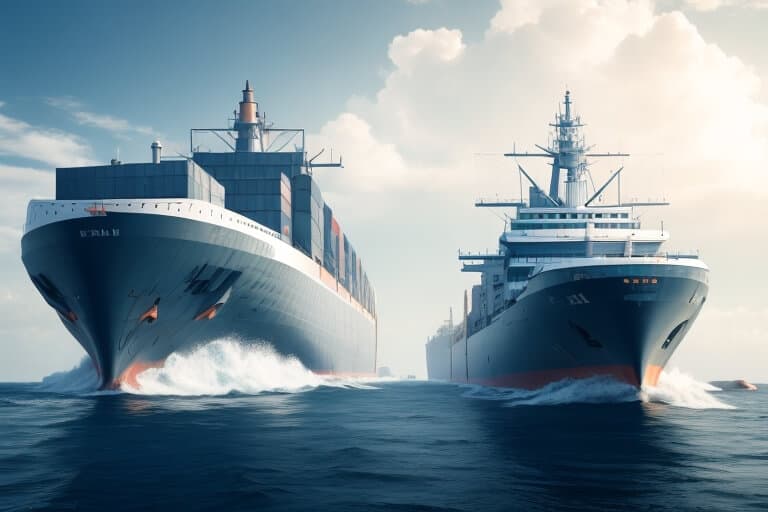
- January 6, 2024
- allix
- Research
The growing fascination with self-driving vehicles has fueled a wave of intense study into the maritime sector, specifically targeting the creation of autonomous maritime vessels. The central challenge for these vessels is to navigate a predefined route on the ocean while bypassing barriers, accounting for water depths, and acknowledging the vessel’s maneuvering capabilities.
Straying from the designated route due to harsh weather conditions carries the threat of grave incidents, including collisions, groundings, or making unintended contact with objects. These vessels need to possess systems that effectually counter such deviations.
Current strategies to evaluate how well these autonomous ships stay on course typically lean on oversimplified ship models, which fall short in replicating the complex dynamics between the ship’s structure, the propulsion system, and various external pressures, resulting in poor accuracy of the ship’s navigational performance estimates.
The International Maritime Organization’s guidelines for the Energy Efficiency Design Index to cut down on greenhouse gas emissions have prompted the Marine Environmental Protection Committee to lay down rules for calculating the least amount of engine power necessary to preserve a ship’s ability to maneuver in challenging weather.
Given these circumstances and the pressing need to precisely gauge navigational performance, a group of international researchers headed by Associate Professor Daejeong Kim from the Division of Navigation Convergence Studies at the National Korea Maritime & Ocean University has thoroughly examined the navigational efficiency of these vessels in unkind sea states using an intricate computational fluid dynamics (CFD) simulation, coupled with a line-of-sight (LOS) steering mechanism.
“By harnessing a sophisticated CFD model that includes unsteady behavior and accounts for viscous and turbulent forces as well as the interaction with the water’s surface, we’ve managed to advance the accuracy of our predictions for navigational compliance,” Dr. Kim narrates.
Their research was showcased in the journal Ocean Engineering. The group leveraged the KRISO cargo ship design with its autonomous navigation system and examined the impact of inclement marine conditions, coming at the vessel from different angles, at varying speeds to note how the ship’s speed influenced its ability to remain on track.
Their simulations found that the ship’s path zigzagged in response to these conditions. Notably, the inconsistencies diminished with a boost in the vessel’s driving force – except in scenarios where the waves were hitting from behind at an angle, where engine strength appeared to have minimal impact on the deviations. The vertical lift and nose-to-tail tipping of the ship were largely affected by the wave directions. In every scenario, the ship’s tilting remained under 1.5 degrees. Despite this, the effectiveness of accelerating to enhance navigational steadiness could not be conclusively determined.
Dr. Kim elaborated on the broader significance of their findings: “Our advanced CFD model serves as a significant contribution toward improving secure autonomous sea travel. It also presents a cost-efficient alternative to small-scale free-navigation experiments or extensive full-scale sea trials.”
Categories
- AI Education (39)
- AI in Business (65)
- AI Projects (87)
- Research (107)
- Uncategorized (5)
Other posts
- Medical Treatment in Brazil: Advanced Healthcare, Skilled Specialists, and Patient-Focused Care
- Dental Treatment in China: Modern Technology, Skilled Dentists, and Comprehensive Care for International Patients
- Plastic Surgery in China: Advanced Aesthetic Medicine Supported by Precision, Innovation, and Skilled Specialists
- Ophthalmology in China: Advanced Eye Care Guided by Innovation, Expertise, and Patient-Focused Treatment
- Finding Care, Calm, and Confidence: Why Patients Are Looking Toward Beroun in the Czech Republic
- Choosing Health, Energy, and a New Future: Exploring Gastric Bypass in Diyarbakır, Turkey
- When Facial Hair Tells Your Story: Considering a Beard Transplant in Phuket, Thailand
- When Prevention Becomes Power: Understanding Liver Cirrhosis Risk and Modern Screening Approaches in Spain
- When the Abdomen Signals Something Serious: Understanding Abdominal Aortic Aneurysm and Getting Expert Evaluation in Islamabad
- When Back Pain Becomes More Than “Just Pain”: Understanding the Need for Microdiscectomy
Newsletter
Get regular updates on data science, artificial intelligence, machine



